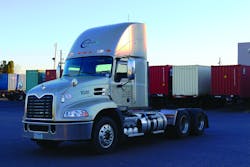Taking the initiative
Headquartered in a test state when the CSA program was under development, BarOle Trucking jumped at the opportunity to take part in the evaluation process. “I even attended three semesters of training to learn how to use the program’s data to improve our operation,” Karol Smith, fleet manager, says.
“We check CSA data on our fleet regularly and recently found that our maintenance BASIC scores needed attention,” Smith continues. “As a result, we changed how we handle inspections and maintenance for our fleet of vehicles in our shop.”
Taking the initiative is nothing new for BarOle Trucking, a for-hire intermodal carrier that hauls international freight on ocean-going containers in six states from rail yards in Minneapolis and St. Paul. Founded in 1984, the carrier has a fleet of 22 company trucks and 133 chassis, and uses the services of 43 owner-operators.
“Our deliveries require a lot of coordination,” Smith states. “In many cases, when we pick up import freight at rail yards, it has to be delivered to the consignee within 24 to 48 hours. Export freight also has to be picked up and delivered to rail yards in order to be loaded onto the trains at a certain time so it will reach ports in time to get loaded onto container ships.”
Ups and downs in import/export markets, economic impacts on freight volumes, and labor issues at ports like those recently on the West Coast add to the challenge of coordinating resources for BarOle Trucking, Smith notes. “If the flow of freight is steady, we can manage assets fairly easily,” she says. “The recession ended all of that predictability, and then after the economy returned to the same rhythm, slowdowns and lockouts at ports changed the game again.”
Smith relates that BarOle Trucking is using technology to take uncontrollable variables, such as weigh station delays that cost time and money, out of the equation. For example, on the recommendation of the Minnesota State Patrol Commercial Vehicle Enforcement Section, the company installed the Drivewyze weigh station bypass service on six trucks that travel past three weigh stations in Minnesota and Wisconsin multiple times each day.
“We didn’t expect a commercial vehicle enforcement officer to tell us how our trucks could navigate weigh stations,” Smith explains, “but it turns out they wanted us to use the bypass service so they could concentrate their attention on trucks and operators that didn’t have good safety records.”
It also turns out that the benefits to BarOle Trucking are measurable. “The six trucks that use the Drivewyze service are avoiding an average of about 15 hours in weigh station delays each month,” Smith relates. “That time savings gives us the ability to move up to an additional four loads of freight per month. The service also makes it easier for our dispatchers because they’re not constantly juggling schedules to make up for lost time at the weigh stations.
“Those trucks are also using about 60 fewer gallons of fuel each month,” Smith adds. “Even with relatively low fuel prices we’re saving over $130 per month, which more than pays for the service.”
Smith notes as well that the time and fuel savings company drivers have gained with the weigh station bypass capability have caught the attention of the company’s owner-operators, particularly those who drive the same routes. “Even though they’re a skeptical bunch,” she says, “they’re giving this technology a really good look.”
